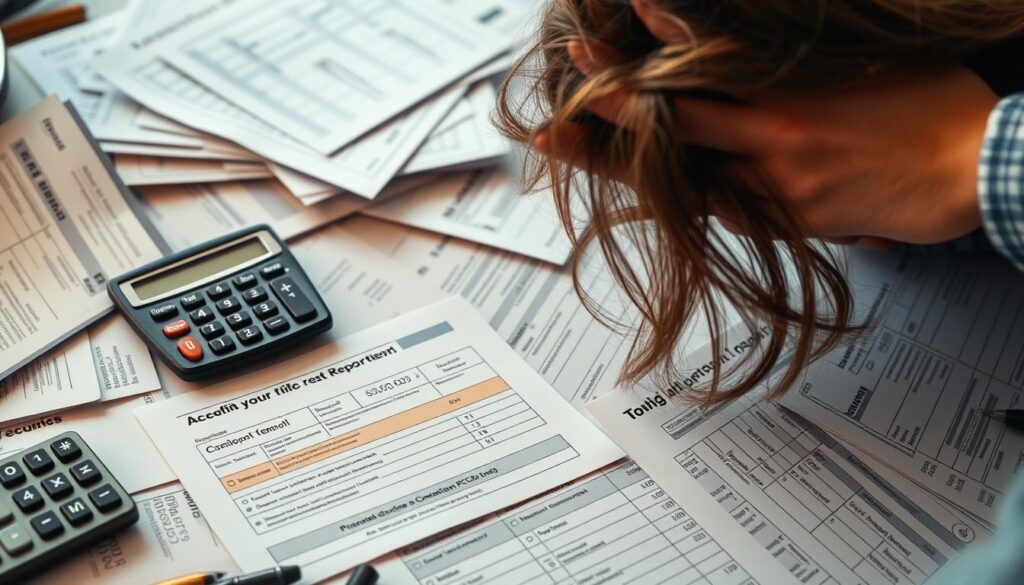Credit report errors can be tricky to handle. But knowing your Fair Credit Reporting Act (FCRA) rights is key. This guide will help you spot, challenge, and fix mistakes on your credit reports.
You’ll learn how to keep your credit info accurate and trustworthy. We’ll cover the steps to dispute errors and start investigations.
You’ll also discover what credit bureaus must do when you file a dispute. We’ll explore ways to hold them responsible for FCRA violations.
Key Takeaways
- Understand your rights under the Fair Credit Reporting Act (FCRA) to dispute inaccurate credit report information.
- Learn the steps to effectively challenge credit report errors and initiate the dispute investigation process.
- Discover the credit bureau’s obligations and timelines for investigating and resolving disputed items.
- Explore strategies to hold credit bureaus accountable for FCRA violations and maintain accurate credit reports.
- Understand the impact of inaccurate credit reports and how to rebuild your credit after a successful dispute.
Understanding the Fair Credit Reporting Act
The Fair Credit Reporting Act (FCRA) protects consumer rights in credit reporting. It regulates how personal credit information is collected and used. This law empowers individuals against inaccuracies and unfair practices.
The FCRA ensures credit reports are fair, accurate, and private. It gives consumers the right to access their credit information. You can also dispute any errors you find.
What is the FCRA?
The FCRA was enacted in 1970. It sets rules for credit bureaus, lenders, and others handling consumer credit data. The act protects consumers’ credit information and rights.
Key Consumer Protections Under the FCRA
- The right to access your credit report and receive a free copy annually
- The ability to dispute inaccurate information on your credit report and have it investigated by credit bureaus
- Restrictions on who can access your credit information and for what purposes
- Requirements for credit bureaus to maintain reasonable procedures to ensure the accuracy of credit reports
- Limitations on the reporting of negative information, such as late payments or bankruptcies
Knowing your FCRA rights helps you maintain accurate credit profiles. You can actively protect your financial well-being and credit standing. Take charge of your credit information today.
“The Fair Credit Reporting Act is a vital piece of legislation that empowers consumers and holds credit bureaus accountable for the accuracy and responsible use of personal credit data.”
Common Credit Report Errors
Credit reports affect our financial lives greatly. They determine our ability to get loans, credit cards, and even jobs. Unfortunately, these reports often contain credit report errors.
A common error is accounts that don’t belong to you. This happens when personal info is linked to the wrong credit file. Such mistakes can harm your creditworthiness.
Another issue is wrong account balances or payment histories. Creditors may give wrong info to credit bureaus. This can distort your credit profile.
“Inaccurate credit reports can have serious consequences, from being denied a loan to facing higher interest rates. Consumers must be vigilant in monitoring their credit reports and addressing any errors they find.”
It’s vital to check your credit reports often. Look for any credit report errors and fix them quickly. This helps maintain good data accuracy.
By ensuring correct credit file corrections, you can keep a strong credit profile. This protects your financial health in the long run.

Disputing Inaccurate Credit Report Information
You have the right to dispute wrong information on your credit reports. The credit bureau dispute process has key steps to keep your credit file accurate.
These steps ensure your credit information stays up-to-date. It’s important to follow them carefully for the best results.
Steps to File a Credit Bureau Dispute
- Identify the inaccurate information on your credit report.
- Contact the relevant credit bureau(s) – Equifax, Experian, or TransUnion – to initiate a dispute.
- Provide a detailed explanation of the error and supporting documentation.
- Submit your dispute through the credit bureau’s online portal, by mail, or by phone.
- Monitor the progress of your dispute and the credit bureau’s investigation.
- Review the bureau’s final decision and, if necessary, take additional steps to correct the issue.
Required Documentation for Disputes
When filing a credit bureau dispute, you need to provide supporting documents. These help prove your case and speed up the process.
- A copy of your credit report highlighting the inaccurate information
- Copies of any relevant documents, such as payment receipts or account statements, that prove the information is incorrect
- A detailed letter explaining the error and your request for correction
- Your personal identification, such as a driver’s license or utility bill, to verify your identity
Following the right steps helps ensure a successful credit bureau dispute. This protects the accuracy of your credit information.
Proper documentation is key to resolving issues quickly. It helps credit bureaus understand and address your concerns effectively.
“Maintaining accurate credit reports is essential for securing favorable loan terms, employment opportunities, and even rental agreements. Disputing inaccuracies is a critical consumer right under the Fair Credit Reporting Act.”
The Credit Bureau Dispute Investigation Process
Credit bureaus must investigate disputed information within a set timeframe. They verify details with the original data provider, like a lender. After the investigation, they inform consumers of the results and any changes made.
Timelines and Procedures for Investigations
The Fair Credit Reporting Act (FCRA) gives credit bureaus 30 days to investigate disputes. In some cases, this can extend to 45 days. During this time, credit bureaus follow specific steps.
They review the consumer’s dispute and supporting documents. Then, they contact the data furnisher to verify the information’s accuracy. Finally, they decide whether to modify, delete, or keep the disputed item.
- Review the consumer’s dispute and supporting documentation
- Contact the data furnisher to verify the accuracy of the disputed information
- Determine whether the disputed item should be modified, deleted, or remain unchanged on the consumer’s credit report
- Provide the consumer with the results of the investigation, including any changes made to their credit report
If information is inaccurate or can’t be verified, the bureau must remove or correct it. This ensures credit bureau compliance and data accuracy in consumer credit files.
| Investigation Timeframe | Actions Required |
|---|---|
| 30 days |
|
| 45 days (extended) |
|
Knowing the credit bureau dispute investigation process helps consumers navigate credit bureau disputes. This knowledge empowers them to maintain accurate credit reports.

Reinvestigation Requirements for Credit Bureaus
The Fair Credit Reporting Act sets strict rules for credit bureaus investigating disputed credit report information. When a credit bureau dispute is filed, they must thoroughly check the accuracy of the disputed data.
Credit bureaus must follow specific procedures for credit bureau disputes. They have 30 days to investigate and provide results to the consumer. If information is inaccurate, they must quickly update or delete it to ensure data accuracy.
The FCRA requires credit bureaus to maintain procedures preventing future errors. They must fix the dispute and address the root cause of inaccurate information.
These reinvestigation requirements protect the accuracy of consumer credit reports. Consumers can trust that credit bureaus will take their credit bureau disputes seriously. They work hard to solve any data accuracy issues.
Credit Repair Services and the FCRA
Credit repair services help consumers dispute inaccurate information on their credit reports. It’s vital to know your rights under the Fair Credit Reporting Act (FCRA). Understanding FCRA limitations helps you make smart decisions about your credit health.
The FCRA gives you power to fix errors in credit bureau disputes. Credit repair services can help, but they’re not a cure-all. Remember, these companies can’t do anything you can’t do yourself.
Know the FCRA’s rules before using a credit repair service. Learn how to dispute wrong information on your own. This knowledge helps you decide if you need professional help.
Navigating the FCRA and Credit Repair
Knowing your FCRA rights lets you control your credit health. You can avoid pricey services by learning to dispute errors yourself. Monitoring your credit reports is a powerful tool for accuracy.
“Credit repair companies cannot do anything that the consumer cannot do themselves.”
Credit repair services can help in some cases. But they’re not a magic fix. Stay alert by checking your credit reports often. Dispute any mistakes you find right away.
Take charge of your credit profile. Regular monitoring and quick action on errors keep your credit healthy. This proactive approach is key to maintaining good credit.
FCRA Credit Bureau Disputes and Your Rights
The Fair Credit Reporting Act (FCRA) offers key rights for credit bureau disputes. These rights help you manage and protect your credit file effectively.
FCRA allows you to get a free credit report yearly. You can get one from each major bureau: Experian, Equifax, and TransUnion. This lets you check your credit info and spot any errors.
If you find mistakes, FCRA lets you dispute them with credit bureaus. They must investigate and fix any proven errors. This keeps your credit file accurate.
FCRA requires bureaus to finish investigations within 30 days. This gives you quick answers about your credit concerns. If they find an error, they must remove it from your report.
Knowing your FCRA rights helps you keep your credit info correct. It protects your financial health. Stay alert and fix credit report issues fast for a good credit profile.
| Key FCRA Rights for Consumers | Description |
|---|---|
| Free Annual Credit Report | Consumers can receive a free credit report from each of the three major credit bureaus once every 12 months. |
| Dispute Inaccuracies | Consumers have the right to dispute any errors or inaccuracies found in their credit reports. |
| Timely Investigations | Credit bureaus must complete investigations of disputed items within 30 days. |
| Correction of Errors | Credit bureaus must remove any verifiable errors from a consumer’s credit report. |
Using your FCRA rights helps keep your credit info accurate. It safeguards your financial health. Stay watchful and fix credit issues quickly for a strong credit profile.
Holding Credit Bureaus Accountable
Credit bureau compliance and the Fair Credit Reporting Act (FCRA) protect consumers’ rights. You can hold credit bureaus responsible for mistakes in your credit reports. This ensures the credit bureau dispute process works properly.
Penalties for FCRA Violations
Credit bureaus face consequences if they don’t follow FCRA rules. Consumers can take legal action against them. Here are some potential penalties:
- Fines for non-compliance with FCRA regulations
- Monetary damages for consumers who have suffered harm due to credit bureau errors or negligence
- Court orders requiring credit bureaus to correct inaccurate information on a consumer’s credit report
Holding credit bureaus accountable ensures a fair credit bureau dispute process. It helps address any credit report errors quickly and effectively.
“Consumers have the power to hold credit bureaus responsible for their actions, and it’s important to exercise this right to protect your financial well-being.”
Upholding credit bureau compliance and the Fair Credit Reporting Act is crucial. It protects the credit reporting system’s integrity. It also safeguards your consumer rights.

Maintaining Accurate Credit Reports
Checking your credit reports often is key to keeping your financial health in check. Regular reviews help spot errors that might sneak into your file. This practice safeguards your financial future and ensures accurate data.
Regular Credit Report Monitoring
Here’s how to keep your credit reports accurate:
- Obtain your credit reports from the three major credit bureaus (Experian, Equifax, and TransUnion) at least once a year.
- Carefully review each report for any discrepancies, such as incorrect personal information, erroneous account details, or fraudulent activity.
- If you discover any credit report errors, initiate a credit file correction by filing a dispute with the relevant credit bureau(s).
- Monitor your credit reports on an ongoing basis to ensure that any credit repair efforts are reflected accurately and that your data accuracy remains high.
| Credit Bureau | Contact Information | Dispute Process |
|---|---|---|
| Experian | Phone: 1-888-397-3742 Website: www.experian.com | Online, by mail, or by phone |
| Equifax | Phone: 1-800-685-1111 Website: www.equifax.com | Online, by mail, or by phone |
| TransUnion | Phone: 1-800-916-8800 Website: www.transunion.com | Online, by mail, or by phone |
Stay alert about your credit report’s accuracy. This helps show your true creditworthiness. Better financial chances await those who keep their reports in check.
Rebuilding Credit After a Dispute
A successful credit bureau dispute can help remove or correct negative information on your credit report. This is a crucial step in rebuilding your credit. Understanding the dispute’s impact and maintaining healthy credit habits can improve your credit score.
After credit file corrections, monitor your credit report regularly. This ensures disputed information is removed and no new errors appear. Regular checks help identify data accuracy issues early, allowing quick action.
Focus on building positive credit history. Make on-time payments and keep credit card balances low. Diversify your credit mix. These habits boost credit repair efforts and show lenders your creditworthiness.
Consider applying for new credit after removing negative information. A secured credit card or credit-builder loan can help. These accounts can rebuild your credit history if managed responsibly.
Credit bureau disputes are just one step towards better financial health. Stay vigilant and maintain good credit habits. Use available tools and resources to rebuild your credit and reach financial goals.

| Key Steps for Rebuilding Credit After a Dispute |
|---|
|
“Rebuilding credit after a dispute is a journey, but with the right steps and dedication, you can reclaim your financial health.”
The Impact of Inaccurate Credit Reports
Incorrect info on your credit report can harm your financial health. It can lower your credit score and make getting loans harder. These errors may affect your job and housing prospects too.
Credit report mistakes can hurt your credit score. Inaccurate data can lead to a lower credit score, making it tough to get good interest rates. This can be a problem when buying a home or car.
Wrong credit reports can cause loan and credit card denials. They can also lead to rejected rental applications. Many people use credit reports to judge financial responsibility.
Knowing the importance of correct credit data is key. Learn your rights under the Fair Credit Reporting Act (FCRA). Know how to dispute wrong info to protect your credit score.
“Inaccurate credit reports can have far-reaching consequences, from limiting your access to credit to jeopardizing your employment and housing opportunities. Taking proactive steps to correct these errors is crucial for maintaining financial stability.”
| Consequences of Inaccurate Credit Reports | Impact |
|---|---|
| Lower Credit Scores | Difficulty obtaining loans, credit cards, and favorable interest rates |
| Denial of Loan Applications | Inability to finance major purchases, such as a home or a vehicle |
| Rental Application Rejections | Challenges in finding suitable housing |
| Employment Opportunities Denied | Potential loss of job opportunities due to concerns about financial responsibility |
Consumer Resources for FCRA Compliance
Understanding the Fair Credit Reporting Act (FCRA) can be challenging for consumers. Fortunately, many agencies and organizations offer help. They ensure credit bureau compliance and protect consumer rights regarding data accuracy.
Government Agencies and Non-Profit Organizations
The Federal Trade Commission (FTC) enforces the FCRA. It provides detailed information on consumer credit rights. The Consumer Financial Protection Bureau (CFPB) shields consumers from unfair practices in finance.
Non-profit credit counseling agencies are also valuable resources. They offer free or low-cost services to help consumers. These include understanding credit reports, disputing errors, and improving credit scores.
“Empowering consumers with knowledge and resources is essential in the fight for fair and accurate credit reporting.”
These agencies and organizations are powerful allies for consumers. With their help, people can navigate FCRA rules confidently. They ensure their rights are protected and credit reports stay accurate.
Protecting Your Credit Rights
The Fair Credit Reporting Act (FCRA) safeguards your financial well-being. It grants you essential rights to maintain accurate credit reports. These rights help protect your credit score.
The FCRA allows you to dispute inaccurate information on your credit report. You can request a free annual credit report from Experian, Equifax, and TransUnion. If you spot errors, you can file a credit bureau dispute.
Credit bureaus must maintain accurate consumer credit data. If they fail to investigate or correct errors promptly, you can seek legal action. You may hold them responsible for any resulting damages.
Regular credit report monitoring is crucial for financial accuracy. By reviewing reports often, you can address issues quickly. This protects your consumer rights and maintains your credit profile.
| Key FCRA Consumer Rights | Description |
|---|---|
| Right to Dispute Inaccuracies | You can dispute any errors or incorrect information on your credit report with the credit bureaus. |
| Right to Free Annual Credit Reports | You are entitled to a free credit report from each of the three major credit bureaus every 12 months. |
| Right to Accurate Credit Data | Credit bureaus must investigate disputes and correct inaccurate credit bureau disputes in a timely manner. |
| Right to Hold Credit Bureaus Accountable | If credit bureaus fail to comply with FCRA regulations, you can seek legal action and recover damages. |
Understanding your rights under the Fair Credit Reporting Act is crucial. It empowers you to maintain accurate credit reports. By exercising these rights, you can secure your financial future.
Conclusion
The Fair Credit Reporting Act (FCRA) empowers you to manage your credit. It’s crucial to check your credit reports often. Challenge any mistakes you find and hold credit bureaus responsible for accuracy.
The FCRA offers vital consumer protections for credit information. Stay informed about your rights under this act. Being proactive safeguards your credit and helps you reach financial goals.
Your credit report is key to your financial health. Use FCRA tools to dispute errors and build a strong credit history. With effort, your credit report will show your true financial responsibility.

